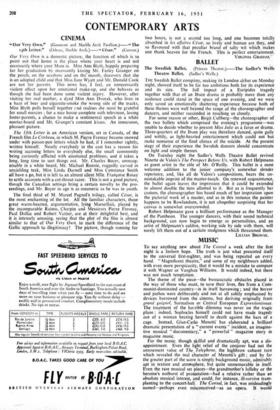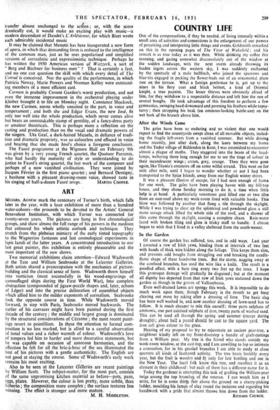MUSIC
To say anything new about The Consul a week after the first night is a forlorn hope. The truth is just what presented itself to the universal first-nighter, and was being repeated on every hand. " Magnificent theatre," and some of my neighbours added, with even more perspicacity, that it would be a mistake to compare it with Wagner or Vaughan Williams. It would indeed, but there was not much temptation.
The theme of the piece—the bureaucratic obstacles placed in the way of those who must, to save their lives, flee from a Com- munist-dominated country—is in itself harrowing ; and the horror and pathos were deliberately and not at all subtly emphasised by devices borrowed from the cinema, but deriving originally from grand guignol. Surrealism or Central European Expressionisnsus. The treatment of the horrible dilemma was never on the tragic plane.; indeed. Sophocles himself could not have made tragedy out of a woman beating herself to death against the bars of a cage. Instead, Gian-Carlo Menotti- has elaborated a brilliant dramatic presentation of a "current events" incident, an imagina- tive musical "documentary," a " powerful " magazine story in magazine music.
For the music, though skilful and dramatically apt, was a dis- appointment. Even the light relief of the conjurer had not the amusement value of The Telephone, the highbrow cabaret turn which revealed the real character of Menotti's gift: and by far the greater part of the score is simply background music, admirably apt in texture and atmosphere, but quite unmemorable in itself. Even the rare musical set pieces—the grandmother's lullaby or the heroine's outburst of protestation—had a relative rather than an absolute musical interest, and could, for instance, ill-survive trans- planting to the concert-hall. The Consul, in fact, was misleadingly named—perhaps even misconceived—as an opera. It would transfer almost unchanged to the screen; or, with the score drastically cut, it would make an exciting play with music—a modern descendant of Daudet's L'Arlesienne, for which Bizet wrote such admirable incidental music It may be claimed that Menotti has here inaugurated a new form of opera, in which that demanding form is reduced to the intelligence of the common man, just as he uses popularised and simplified versions of surrealistic and expressionistic technique. Perhaps he has written the 1950 American version of Wozzeck, a sort of "Berg and Buchner for business men ? That is certainly a feat, and no one can question the skill with which every detail of The Consul is conceived. Nor the quality of the performance, in which Patricia Neway, Marie Powers and Norman Kelley were outstand- ing members of a most efficient cast.
Carmen is probably Covent Garden's worst production, and not even the immense improvement in the orchestral playing under Kleiber brought it to life on Monday night. Constance Shackock, the new Carmen, seems wholly unsuited to the part, in voice and temperament ; and both she and Edgar Evans, the new Jos& fit only too well into the whole production. which never comes alive but bears an unmistakable stamp of gentility, of a fancy-dress party or amateur theatricals. This is perhaps more a reflection on the casting and production than on the vocal and dramatic powers of the singers. Uta Graf, a dark-haired Micaela, in defiance of tradi- tion and dramatic propriety, was so colourless and effaced in voice and bearing that she made Jose's choice a foregone conclusion.
The Faure programme at the Wigmore Hall on February 9th was given by a very young French quartet, the Quatuor Parrenin, who had hardly the maturity of style or understanding to do justice to Faure's string quartet, the last work of the composer and perhaps of a now vanished civilisation. They were joined by Jacques Fevrier in the first piano quartet ; and Bernard Demigny, a baritone with a pleasant drawing-room voice, showed taste in his singing of half-a-dozen Faure songs. MARTIN COOPER.



































 Previous page
Previous page